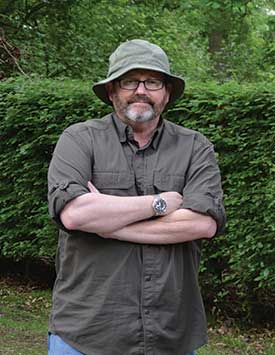
It’s a blustery day in March, and a group of 60 high school students from southwestern Germany gathers on the now-grassy battlefield of Verdun, France. They’re studying All Quiet on the Western Front, and the ground beneath their feet remains pockmarked with shell holes and damaged trenches from when it was the stage for one of the longest and bloodiest battles of the First World War more than 100 years ago.
“If they’re reading about the characters in shell holes, we’re going to have them stand in shell holes to grasp the emotional impact of what they’re reading,” says Dr. Bill Harris ’16. As the command historian at Ramstein Air Base in Germany, Harris was invited by local educators to help plan the trip.
Site visits such as these complement Harris’ work at the headquarters for the U.S. Air Forces Europe and Africa. With a team of historians, Harris creates a daily chronology of the command’s actions and oversees several hundred pieces of historic property, ranging from display aircraft to World War II flying jackets.
Harris’ nearly 42 years with the U.S. Air Force included 24 years on active duty, joining front-line troops across Europe and the Pacific to document field conditions, make photographs, and record oral histories. While stationed at Royal Air Force Lakenheath in Suffolk, England, the discovery of sixth-century bones sparked Harris’ interest in constructing meaning through artifacts. This inspired him to earn two master’s degrees, the first in education from National Louis University, followed by one in humanities from California State University, Dominguez Hills.
“I thought I was finished with my education,” Harris says. But in 2010, an assignment to Louisiana’s Barksdale Air Force Base included responsibility for three field museums, none of which had formal education programs. To develop programs that tied into the public school curriculum, Harris needed a deeper understanding of how teachers approach history. So in August 2011, he began a 5-year journey at Walden to his Doctor of Education (EdD).
Walden’s online program allowed Harris to take classes while stationed in Louisiana and Germany. Although at times he felt like “a fish out of water” among professional educators, the first course showed him a whole wealth of new knowledge that he could apply to his work.
Harris’ doctoral study on historical empathy shaped his approach to educational experiences, from student field trips to Air Force professional development workshops to base visits with military families. “I wanted to figure out how to best use a site to teach,” he says. “There’s nothing more gratifying than to watch someone make a connection with the material you’re presenting when you’ve allowed them to learn for themselves and you, as the teacher, are only the facilitator.”
With a doctorate in education, Harris sees his work from a new perspective. “Most people would be winding down their career after 40 years,” he says. “But now that I’ve completed my EdD, I feel like I’m a 20-year-old kid that has embarked on a new journey. My eyes are opened to looking into challenges, and every day I see my work through a different lens.”



